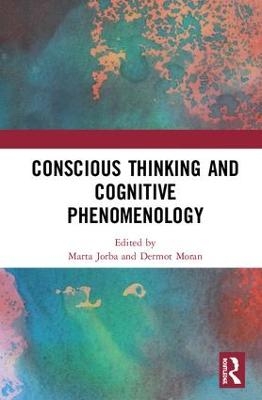
Conscious Thinking and Cognitive Phenomenology
Routledge (Verlag)
978-0-8153-5907-4 (ISBN)
This book concerns the nature and character of conscious thinking from a philosophical perspective. One main aspect of conscious thinking addressed by the contributors is the phenomenal character involved in undergoing an episode of thinking or, in other words, the question of what it is like to think a certain thought, what has been called ‘cognitive phenomenology’. This contested phenomenal character constitutes a form of phenomenal consciousness that needs clarification and further consideration within consciousness studies, cognitive psychology and philosophy.
The present volume brings together chapters on the topic that contribute to clarify the notions and questions involved in the discussion, expanding the scope of the debate on cognitive phenomenology to other relevant aspects of conscious thinking and related domains. Several different topics are treated in the book, such as the relation of cognitive phenomenology with rationality, with the self, with attention or with the notion of cognitive access, as well as consideration of particular kinds of experiences of recognition and the so-called ‘aha’ experiences.
The chapters in this book were originally published as a special issue of Philosophical Explorations.
Marta Jorba is Juan de la Cierva postdoctoral researcher at the University of the Basque Country, Spain. Her main research interests are in the philosophy of mind (with a particular focus on cognitive phenomenology, inner speech and the nature of conscious thinking more generally) and in feminist theory. Her work has been published in journals such as Noûs, Journal of Consciousness Studies, International Journal of Philosophical Studies, or Theoria. Dermot Moran is Joseph Chair in Catholic Philosophy at Boston College and Professor at University College Dublin. He is president of the International Federation of Philosophical Societies. His recent publications include Husserl’s Crisis of the European Sciences and Transcendental Phenomenology: An Introduction (2012).
1. Conscious thinking and cognitive phenomenology: topics, views and future developments 2. The phenomenology of attitudes and the salience of rational role and determination 3. Thinking of oneself as the thinker: the concept of self and the phenomenology of intellection 4. Kant’s and Husserl’s agentive and proprietary accounts of cognitive phenomenology 5. The nature of unsymbolized thinking 6. Cognitive access and cognitive phenomenology: conceptual and empirical issues 7. Why Frege cases do involve cognitive phenomenology but only indirectly
| Erscheinungsdatum | 12.06.2018 |
|---|---|
| Verlagsort | New York |
| Sprache | englisch |
| Maße | 174 x 246 mm |
| Gewicht | 412 g |
| Themenwelt | Geisteswissenschaften ► Philosophie ► Philosophie der Neuzeit |
| Geisteswissenschaften ► Psychologie ► Biopsychologie / Neurowissenschaften | |
| Geisteswissenschaften ► Psychologie ► Verhaltenstherapie | |
| ISBN-10 | 0-8153-5907-1 / 0815359071 |
| ISBN-13 | 978-0-8153-5907-4 / 9780815359074 |
| Zustand | Neuware |
| Haben Sie eine Frage zum Produkt? |
aus dem Bereich


